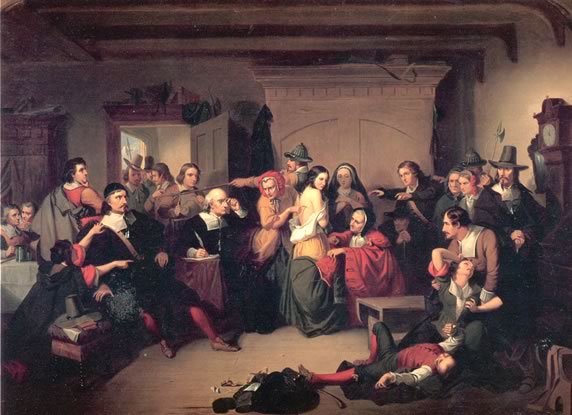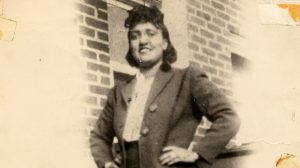Why would adults in Salem, Massachusetts in the 1690s take the accusations of nine year old girls seriously? During the seventeenth century, New England had grown diverse. The people living in the communities were of different backgrounds. But in the 1690’s there was an apparent outbreak of witchcraft. The most famous of these outbreaks was the event in Salem, Massachusetts in 1692 that stirred up the Salem community and soon spread to other communities.
The widespread hysteria over witches was all over the town after an accusation of witchcraft was made in January 1692. A group of young adolescent girls met in the home of Samuel Parris, a Puritan pastor in Salem. The pastor had a nine year old daughter, Betty. Betty and her cousin Abigail were fascinated by the voodoo tales and tricks told to them by the family slave. The family slave, Tituba, was the one whom the little girls had sought after for entertainment.1 It was not long after their time spent with Tituba, when the girls began to behave strangely; seeing visions, babbling at times, and lapsing into trances. The Puritans thought that these behaviors were of witchcraft, as the work of the devil. People in Salem began believing the girls, and charged Tituba and two other village women for practicing witchcraft on them. Two men, John Hathorne and Johnathan Corwin of Massachusetts, were called to do a legal examination of the women. The Puritans followed the Old Testament law. This was how they assessed the examinations. Scripture had a statement that said witches were not able to live. The two men knew exactly what they had to do. The examination was done on these women of Salem by looking for a certain mark on the body: a wart or tit. This specific mark was said to be the place where the devil and his demons would take blood out of the witch.2 Many of the women accused were of lower status in the community.

Research shows most of the accused witches were middle-aged women, widowed, with few or no children. Also, if the woman had been involved with domestic conflicts, they were accused. The women were accused of crimes and appeared to be dangerous by their neighbors. Women in Salem who inherited or possessed land were also accused of witchcraft.3 The accusations towards these women were out of the ordinary and seemingly wrong. One must first think about the view of women during this time. They were undermined and portrayed as having no power or knowledge of such things; they were subservient to the men in the community. Not only were low class women accused of witchcraft, but as time passed, superior women were accused as well.4
On October 29th, the Salem Witch Trials were called to an end. Governor Phips dismissed the Court and that marked the end to the witch hunt craze. Many were disappointed about the ending of the trials, but many were glad to return to work.5 The community in Salem blamed Pastor Parris for letting the innocent die. The people of the Salem church also voted to void his salary. In the following years, those family members of the deceased were restored their good names. The families were awarded a compensation for all the financial loses they went through during such tragic times. Increase Mather, a pastor of the Boston Puritan Church, wanted the people to do away with the court because he believed they put innocent people to death.
The Witch trials took on an important role in American History. The trials became a tragic and memorable moment in history. Generational, racial, and sexual hostility, opposition to law, social stresses, and food poisoning were all causes as to why the people had anxieties that found release in the witch hunt craze. The witch hunts became searches for scapegoats; the community leaders were looking for anyway possible to ease the community’s anxieties.6
- Kenneth P. Minkema, “In the Devil’s Snare: The Salem Witchcraft Crisis of 1692,” The Christian Century, no. 8 (2003): 37. ↵
- Salem Press Encyclopedia, January 2015, s.v. “Salem Witchcraft Trials,” by Warren M. Billings and Kimberly Manning. ↵
- Alan Brinkley, American History, 15th ed., vol. 1: to 1865 (2 Penn Plaza, New York, NY 10121: McGraw Hill Education, 2015), 86-87. ↵
- Salem Press Encyclopedia, January 2015 s.v. “Salem Witchcraft Trials,” by Warren M. Billings, Kimberly Manning. ↵
- Salem Press Encyclopedia, January 2015 s.v. “Salem Witchcraft Trials,” by Warren M. Billings, Kimberly Manning. ↵
- Salem Press Encyclopedia, January 2015 s.v. “Salem Witchcraft Trials,” by Warren M. Billings and Kimberly Manning. ↵



178 comments
Johnanthony Hernandez
Interesting to see how the words of a few could influence the actions of an entire settlement. The accusations of two nine year old girls gave birth to one of he most tragic events of early US history, and to think this all started because of an interest in the voodoo practices of a family slave. The Salem Witch trials became associated with false accusations from then on, it interesting to think that it all began with a village taking the word of two young children and giving into mass hysteria.
Alyssa Valdez
Very informative! I actually did an argument paper on the Salem witch trials last semester and this is all very new information I wish I knew about when I was writing my paper. I find it so funny how a bunch of young girls were able to turn a whole colony upside down, with no evidence at all! And they believed them! Even though I get so frustrated looking back at the Salem witch trials, it’s a topic I always enjoy reading. Great read, I can tell you worked hard on it!
Jennifer Pogue
Although they are very odd, the Salem witch trials are one of my favorite events in American history. It is so strange that these wise and educated men turned on the women of the community and believed these girls. In previous history classes I remember learning that if a person admitted to being a witch (even if they weren’t) they would not be hung. It is sad to think these people had to choose between telling a lie and living or telling the truth and dying.
Briana Bustamante
I find this topic to be very interesting and this article very informing. Every Halloween my sister and I watch the movie Hocus Pocus, so i had a little insight on this topic. I was baffled that the town would believe that little girls were being controlled by witchcraft. This incident effected not only the town but the lifetimes to come. I find it interesting that families who were involved would detach the stigma attached to their name. Over all this article was enjoyable to read.
Mariana Govea
The Salem Witch Trails is such a fascinating topic! And great and interesting read! With everything that has happened in our history it is hard to go back and remember the Salem witch trails since it is hard to relate now a days, but how could one forget about it, after so many innocent souls were killed! I was aware of the trials and how every women who was doubted would be murdered, but I did not know of how the witch trails started, as well as I found it interesting and now after reading this article it made sense how many women that came from lower classes, or women that possessed land were blamed the most for witch craft and with that being said we can conclude that since this was happening in a time where women did not have any say or place in society, women with land were not permitted therefore they would exterminate them , and fro the lower classes many of these women had nobody to back them up therefore it was easier to sentence one to witchcraft! Really enjoyed this article wouldnt have known or concluded any of it if I wouldn’t have read it thoroughly!
Tina Valdez
I forget that this event was such an important part of history. It is easy to separate myself from this part of history because it is difficult to relate to. Witch hunts became common around the time of the Salem Witch Trials and it makes you wonder about the innocent lives that were taken – and all because of accusations of young girls. Your article was very interesting and helped me remember the importance of this historical occurrence.
Jacob Hall
the story of Salem is a fascinating one. to cover up a mistake a young group of girls come up with a story that witches have come to inhabit the town. It was a completely obscure case that caused mass hysteria though put the town. In the end the governor came to dismiss this farce, which I was unaware of. And the town voted to void the salary of Pastor Parris, which was another thing I was unaware of. Your article did a really good job of describing the full and true story of Salem and it is very well researched, well done.
Salvador Rodriguez Gomez
The Salem witch trials are really bizarre and show just how fearful people can be and how other can use that fear to exploit others for their own personal gain. It’s sad to think that this actually happened and many innocent women were hung or had their life negatively affected because of the witch trials.
Yesenia Cardenas
Your opening sentence was wonderful. It is fascinating how a town full of adults would honestly believe that children were witches. Emotions should not overpower our critical thinking.
Maalik Stansbury
I like how this reminds me of pride and prejudice. I think it did a wonderful job describing what really occurred back during this time. I enjoyed how well explained you got with the topic, making sure that people know who were the originators of the accusations. You did this in a well-prepared form, where all my questions were answered.